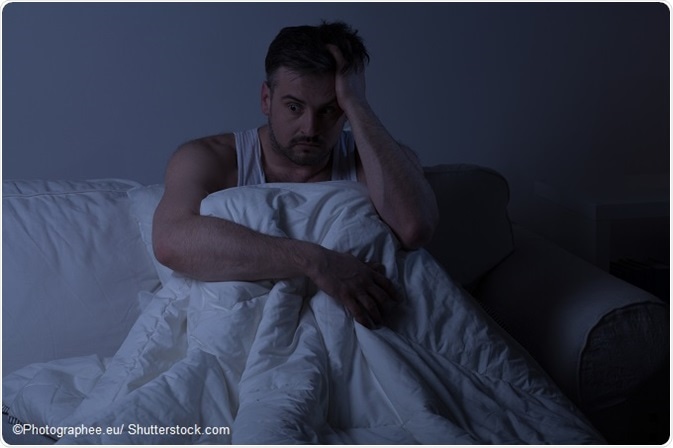Insomnia is the inability to initiate or maintain sleep, or to experience restful or high-quality sleep. It is considered to affect about a third of the population. Different types have been identified depending on the phase of sleep in which difficulty is reported. Thus, sleep-onset insomnia, middle-of-the-night (MOTN) insomnia, or early-morning awakenings are all reported.
When insomnia symptoms last for less than three months, it is termed short-term insomnia, while long-term insomnia lasts longer than this period.

The health and social costs of insomnia are significant because of its associated impairment of daytime functioning, persistent daytime tiredness, and slowing of muscular coordination and reflexes. Healthcare visits are increased by 50% in such patients, with absenteeism and lowered workplace productivity. It is estimated that lowered productivity and driving or other accidents due to sleeplessness cost over $100 billion a year.
Causes
Sleep-onset insomnia can be due to or worsened by a variety of causes:
- Psychological causes such as anxiety, depression, or some psychotic conditions such as schizophrenia
- Medical conditions such as
- chronic or acute pain
- restless legs syndrome (RLS)
- periodic limb movements in sleep (PLMS),
- obstructive sleep apnea
- congestive cardiac failure
- Circadian rhythm disorders such as delayed sleep phase syndrome, night shift work, or jet lag
- Poor sleep hygiene such as a lighted or noisy bedroom, excessive use of alcohol or caffeine shortly before bedtime, over-exercising at night, or being too warm
Children with attention deficit-hyperactivity disorder (ADHD) often have chronic sleep-onset insomnia, which has been reported in almost a third of such patients who are not on medication. The pathophysiology seems to be a delay in the sleep-wake cycle, without any abnormality being detected in sleep maintenance. The normal evening secretion of the sleep-producing hormone melatonin secretion is also delayed. Some specific gene polymorphisms of the biological clock mechanism have been determined to be linked to this disorder.
Exogenous melatonin administration at the right time has been proved to advance this time, producing an earlier onset of sleep. When this treatment is properly carried out, normal sleep onset occurs in these children. However, cessation of the treatment was associated with resumption of delayed sleep onset.
Management
A detailed sleep history will help to identify any deficiencies in sleep hygiene and environmental disturbances which prevent the onset of sleep in a normal manner. Evaluation also includes sleep lab testing such as polysomnography and multiple sleep latency tests.
Nonpharmacologic management
This includes a variety of measures, such as:
- Cognitive behavioral therapy to recognize and modify the pressuring and unpleasant thoughts associated with inability to go to sleep at once, with appropriate behavioral changes
- Stimulus control to ensure that intrusive worries and thoughts are dealt with promptly
- Sleep hygiene training to ensure an environment and bodily condition conducive to the onset of sleep
- Sleep restriction to limit the time spent in bed to the actual sleep time, cutting off the association between insomnia and going to bed
- Paradoxical intention where the patient focuses on staying awake rather than going to sleep, helping ease the mental and emotional burden of sleeplessness and making sleep onset faster
- Relaxation therapy to aid slumber
- Biofeedback
- Bright light therapy which tries to reset the circadian rhythms
- Chronotherapy which corrects the sleep phase delay
Prescription medications
Benzodiazepines have been used traditionally to induce sleep, but their long duration of action and significant residual sedation have been cause for concern.
Nonbenzodiazepines include the sedative GABA-ergic agents such as zolpidem and the newer zaleplon which has a very short half-life, as well as the melatonin receptor agonist trazodone.
Over-the counter medications
Patients with sleep-onset insomnia have traditionally taken sedating antihistamines to hasten sleep onset but they quickly induce tolerance. This is also a serious potential drawback of the benzodiazepines, with which they also share the sedating hang-over of the next morning. The lingering effects of impaired muscular reflexes and coordination, with slowing of memory and a sense of fatigue, have dogged the use of most of these drugs.
Herbal preparations such as melatonin and valerian have been promoted for use in this condition primarily due to this concern.
References
- https://www.stanford.edu/
- https://www.ncbi.nlm.nih.gov/pubmed/19486273
- https://www.ncbi.nlm.nih.gov/pubmed/11292231
- https://www.ncbi.nlm.nih.gov/pubmed/17192164
- https://www.ncbi.nlm.nih.gov/pubmed/10533351
- http://www.nhs.uk/Conditions/Insomnia/Pages/Introduction.aspx
Further Reading
Last Updated: Dec 29, 2022